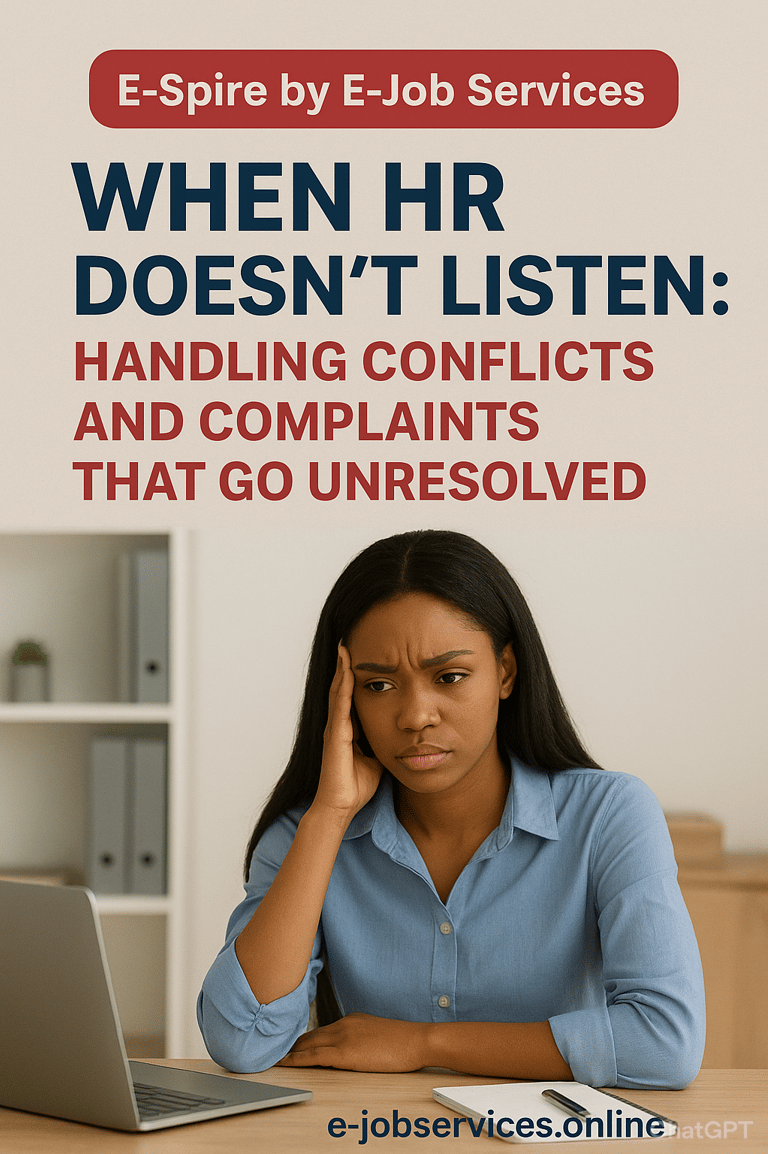When HR Doesn’t Listen: Handling Conflicts and Complaints That Go Unresolved
Unseen, ignored, or unresolved complaints can leave employees feeling powerless and stuck. This article guides you through how to address conflicts when HR doesn’t seem to listen—while staying professional, respectful, and grounded in your rights.
HR & ORGANIZATIONAL ISSUES
E-Spire by E-Job Services
10/13/20252 min read


When HR Doesn’t Listen: Handling Conflicts and Complaints That Go Unresolved
When you bring a conflict or complaint to HR and nothing happens, or things drag on, the frustration, stress, and distrust can build fast. But even in that tough situation, you can act with respect, preserve your integrity, and work toward a resolution. Here’s how:
Key Steps to Handle It Respectfully & Professionally
Document Everything
Write down dates, times, conversations, emails, every detail. This creates a clear record of what happened, what you said, and how HR responded.Follow-up in Writing
If your initial complaint was verbal, send an email summarizing it. Ask for confirmation that they received it and ask politely for expected next steps.Keep Emotions in Check
Express your concerns clearly but calmly. Avoid blaming or aggressive language. Saying something like, “I feel this issue hasn’t been addressed yet, and I’d like your help in understanding why.”Seek Internal Allies
Talk to a trusted supervisor, mentor, union rep, or an employee relations specialist if available. Someone with influence who can check on progress or escalate the issue with you.Use Formal Processes
If informal discussions fail, escalate via written grievance, appeal, or follow your company’s grievance procedure. Ask for a timeline.Know Your Rights
Learn what your contract, handbook, or local labor law says. In many places, there are legal protections when complaints are ignored, especially around harassment, discrimination, etc.Request Feedback / Ask for Status Regularly
Politely ask: “Could you please update me on what actions are being taken?” or “Could you let me know when I can expect a response?” Respectfully maintaining pressure keeps your issue visible.Stay Professional in All Contacts
Be consistent, always courteous, on time, well-prepared. Even if you feel ignored, acting professionally protects your credibility and helps if things escalate.Protect Your Well-Being
Unresolved issues can weigh heavily on mental health. Find support through friends, family, or professional services. Keep work-life boundaries.Consider External Advice or Escalation
If internal channels fail continuously, you might seek advice from legal counsel, a labor board, or other regulatory agency. Use this as a last resort, but do know it’s an option.
Stats & Context (America / Europe / Caribbean)
In the USA, studies show that 42% of employees who experienced harassment or misconduct did not report it. Only about 10% of those unreported concerns were resolved.
Globally, about 85% of employees deal with some form of workplace conflict in their careers.
Nearly half (47%) of formal grievances in the UK stem from conflict with colleagues, more than disputes over pay or flexible working.
In the Caribbean, healthcare workers report high rates of workplace violence and abuse, verbal and emotional abuse especially, and many of those incidents are underreported, which contributes to job dissatisfaction.
References
HR Acuity. 2024 HR & ER Guide (on unreported incidents, employee relations trends).
HR Acuity. Workplace Harassment & Misconduct Insights 2023.
WorkNest survey on workplace grievances in UK organizations.
WorldMetrics / Global reports on workplace conflict & its outcomes.
ViSHWaS-Caribbean study on violence against healthcare workers in the Caribbean.
